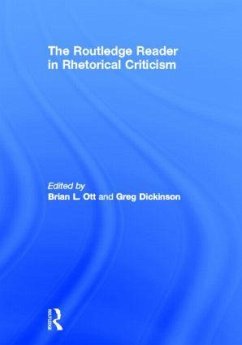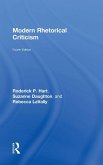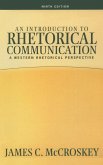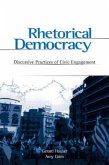The Routledge Reader in Rhetorical Criticism
Herausgeber: Ott, Brian; Dickinson, Greg
The Routledge Reader in Rhetorical Criticism
Herausgeber: Ott, Brian; Dickinson, Greg
- Gebundenes Buch
- Merkliste
- Auf die Merkliste
- Bewerten Bewerten
- Teilen
- Produkt teilen
- Produkterinnerung
- Produkterinnerung
Bringing together 50 key readings on rhetorical criticism in a single accessible format, The Rhetorical Criticism Reader furnishes instructors with an ideal resource for teaching and practicing the art of rhetorical criticism. Unlike existing readers and textbooks, which rely on cookie-cutter approaches to rhetorical criticism, The Rhetorical Criticism Reader organizes the field conceptually, allowing teachers and students to grapple with the enduring issues and debates surrounding criticism over the past 50 years. The readings are organized into four sections, each representing key conceptual…mehr
Andere Kunden interessierten sich auch für
![Modern Rhetorical Criticism Modern Rhetorical Criticism]() Roderick P HartModern Rhetorical Criticism231,99 €
Roderick P HartModern Rhetorical Criticism231,99 €![Rhetorical Criticism Rhetorical Criticism]() Rhetorical Criticism126,99 €
Rhetorical Criticism126,99 €![Rhetorical Theory and Praxis in the Business Communication Classroom Rhetorical Theory and Praxis in the Business Communication Classroom]() Rhetorical Theory and Praxis in the Business Communication Classroom167,99 €
Rhetorical Theory and Praxis in the Business Communication Classroom167,99 €![Rhetorical Work in Emergency Medical Services Rhetorical Work in Emergency Medical Services]() Elizabeth L. AngeliRhetorical Work in Emergency Medical Services167,99 €
Elizabeth L. AngeliRhetorical Work in Emergency Medical Services167,99 €![Introduction to Rhetorical Communication Introduction to Rhetorical Communication]() James C MccroskeyIntroduction to Rhetorical Communication235,99 €
James C MccroskeyIntroduction to Rhetorical Communication235,99 €![Rhetorical and Critical Approaches to Public Relations II Rhetorical and Critical Approaches to Public Relations II]() Robert L Heath / Elizabeth Toth / Damion Waymer (ed.)Rhetorical and Critical Approaches to Public Relations II259,99 €
Robert L Heath / Elizabeth Toth / Damion Waymer (ed.)Rhetorical and Critical Approaches to Public Relations II259,99 €![Rhetorical Democracy Rhetorical Democracy]() Rhetorical Democracy170,99 €
Rhetorical Democracy170,99 €-
-
-
Bringing together 50 key readings on rhetorical criticism in a single accessible format, The Rhetorical Criticism Reader furnishes instructors with an ideal resource for teaching and practicing the art of rhetorical criticism. Unlike existing readers and textbooks, which rely on cookie-cutter approaches to rhetorical criticism, The Rhetorical Criticism Reader organizes the field conceptually, allowing teachers and students to grapple with the enduring issues and debates surrounding criticism over the past 50 years. The readings are organized into four sections, each representing key conceptual issues and debates in rhetorical criticism: critic/purpose, object/method, theory/practice, and audience/consequentiality. Each section is preceded by an introductory essay that puts the readings into context. For added flexibility, an alternative table of contents is also included for instructors and students to customize their teaching and reading. Intended for upper-division undergraduate and graduate courses in rhetorical criticism, The Rhetorical Criticism Reader uniquely lends itself to thoughtful discussion of the role of the critic in the critical process. It assists readers not only in learning the tools of criticism, but also in reflecting on the values that underlie the critical endeavor.
Produktdetails
- Produktdetails
- Verlag: Routledge
- Seitenzahl: 842
- Erscheinungstermin: 18. Oktober 2012
- Englisch
- Abmessung: 260mm x 183mm x 49mm
- Gewicht: 1747g
- ISBN-13: 9780415517546
- ISBN-10: 0415517540
- Artikelnr.: 34226267
- Herstellerkennzeichnung
- Libri GmbH
- Europaallee 1
- 36244 Bad Hersfeld
- gpsr@libri.de
- Verlag: Routledge
- Seitenzahl: 842
- Erscheinungstermin: 18. Oktober 2012
- Englisch
- Abmessung: 260mm x 183mm x 49mm
- Gewicht: 1747g
- ISBN-13: 9780415517546
- ISBN-10: 0415517540
- Artikelnr.: 34226267
- Herstellerkennzeichnung
- Libri GmbH
- Europaallee 1
- 36244 Bad Hersfeld
- gpsr@libri.de
Brian L. Ott is Associate Professor in the Department of Communication at the University of Colorado, Denver. Greg Dickinson is Professor in the Department of Communication Studies at Colorado State University.
Part I: Critic/Purpose
1. Must We All Be 'Rhetorical Critics'? Barnet Baskerville
2. Criticism Ephemeral and Enduring, Karlyn Kohrs Campbell
3. Another Shooting in Cowtown, Thomas W. Benson
4. Rhetoric, Society and the Critical Response, Philip Wander and Steven
Jenkins
5. Rhetorical Criticism as Moral Action, James F. Klumpp and Thomas A.
Hollihan
6. Communication, Social Justice, and Joyful Commitment, Stephen John
Hartnett
7. Leff in Context: What is a Critic's Role? Barbara Warnick
8. The Critic as Empath: Moving Away from Totalizing Theory, Celeste
Michelle Condit
9. Criticism and Authority in the Artistic Mode, Bonnie J. Dow
10. Rethinking Critical Voice: Materiality and Situated Knowledges, Julia
T. Wood and Robert Cox
11. "Voice" and "Voicelessness" in Rhetorical Studies, Eric King Watts
12. Performing Critical Interruptions: Stories, Rhetorical Inventions,
and Environmental Justice Movement, Phaedra C. Pezzullo
Part II: Object/Method
13. Gettsyburg and Silence, Edwin Black
14. Words the Most Like Things: Iconicity and the Rhetorical Text,
Michael Leff and Andrew Sachs
15. Text, Context, and the Fragmentation of Contemporary Culture, Michael
Calvin McGee
16. Object and Method in Rhetorical Criticism: From Wichelns to Leff and
McGee, Dilip Parameshwar Gaonkar
17. Literature as Equipment for Living, Kenneth Burke
18. Accidental Rhetoric: The Root Metaphors of Three Mile Island, Thomas
B. Farrell and G. Thomas Goodnight
19. Fantasy and Rhetorical Vision: The Rhetorical Criticism of Social
Reality, Ernest G. Bormann
20. Refitting Fantasy: Psychoanalysis, Subjectivity, and Talking to the
Dead, Joshua Gunn
21. The Rhetoric of the American Western Myth, Janice Hocker Rushing
22. Spaces of Remembering and Forgetting: The Reverent Eye/I at the
Plains Indian Museum, Greg Dickinson, Brian L. Ott, and Eric Aoki
23. Memory and Reconciliation at the Birmingham Civil Rights Institute,
Victoria J. Gallagher
24. Show/Down Time: "Race," Gender, Sexuality, and Popular Culture,
Thomas K. Nakayama
25. From Public Sphere to Public Screen: Democracy, Activisim, and the
"Violence" of Seattle, Kevin Michael DeLuca and Jennifer Peeples
Part III: Theory/Practice
26. On Viewing Rhetoric as Epistemic, Robert Scott
27. Rhetoric as a Way of Being, Thomas W. Benson
28. Critical Models in the Analysis of Discourse, Thomas B. Farrell
29. Knowledge Claims in Rhetorical Criticism, David Zarefsky
30. Rhetorical Theory as Heuristic and Moral: A Pedagogical
Justification, Barry Brummett
31. Constitutive Rhetoric: The Case of the Peuple Québécois, Maurice
Charland
32. Critical Rhetoric: Theory and Praxis, Raymie E. McKerrow
33. The Critique of Vernacular Discourse, Kent A. Ono and John M. Sloop
34. The Materiality of Discourse as Oxymoron: A Challenge to Critical
Rhetoric, Dana L. Cloud
35. Another Materialist Rhetoric, Ronald Walter Greene
36. Nietzsche and the Aesthetics of Rhetoric, Steve Whitson and John
Poulakos
37. Cinema and Choric Connection: Lost in Translation as Sensual
Experience, Brian L. Ott and Diane Keeling
Part IV: Audience/Consequentiality
38. The Second Persona, Edwin Black
39. The Third Persona: An Ideological Turn in Rhetorical Theory, Philip
C. Wander
40. Contextual Twilight/Critical Liminality: J.M Barrie's Courage at St.
Andrews, 1922, Charles E. Morris III
41. The Rhetorical Limits of Polysemy, Celeste Michelle Condit
42. Polysemy: Multiple Meanings in Rhetorical Criticism, Leah Ceccareli
43. The Spectacular Consumption of "True" African America Culture:
"Wassup" with the Budweiser Guys? Eric King Watts and Mark P. Orbe
44. Vernacular Dialogue and the Rhetoricality of Public Opinion, Gerard
A. Hauser
45. Out-Law Discourse: The Critical Politics of Material Judgment, John
M. Sloop and Kent A. Ono
46. Enacting Red Power: The Consummatory Function in Native American
Protest Rhetoric, Randall Lake
47. Creating Discursive Space through a Rhetoric of Difference: Chicana
Feminists Craft a Homeland, Lisa A. Flores
48. Reflections on Criticism and Bodies: Parables from Public Places,
Carole Blair
49. No Time for Mourning: The Rhetorical Production of the Melancholic
Citizen-Subject in the War on Terror, Barbara Biesecker
50. The Rhetorical Ritual of Citizenship: Women's Voting as Public
Performance, 1868-1875, Angela G. Ray
1. Must We All Be 'Rhetorical Critics'? Barnet Baskerville
2. Criticism Ephemeral and Enduring, Karlyn Kohrs Campbell
3. Another Shooting in Cowtown, Thomas W. Benson
4. Rhetoric, Society and the Critical Response, Philip Wander and Steven
Jenkins
5. Rhetorical Criticism as Moral Action, James F. Klumpp and Thomas A.
Hollihan
6. Communication, Social Justice, and Joyful Commitment, Stephen John
Hartnett
7. Leff in Context: What is a Critic's Role? Barbara Warnick
8. The Critic as Empath: Moving Away from Totalizing Theory, Celeste
Michelle Condit
9. Criticism and Authority in the Artistic Mode, Bonnie J. Dow
10. Rethinking Critical Voice: Materiality and Situated Knowledges, Julia
T. Wood and Robert Cox
11. "Voice" and "Voicelessness" in Rhetorical Studies, Eric King Watts
12. Performing Critical Interruptions: Stories, Rhetorical Inventions,
and Environmental Justice Movement, Phaedra C. Pezzullo
Part II: Object/Method
13. Gettsyburg and Silence, Edwin Black
14. Words the Most Like Things: Iconicity and the Rhetorical Text,
Michael Leff and Andrew Sachs
15. Text, Context, and the Fragmentation of Contemporary Culture, Michael
Calvin McGee
16. Object and Method in Rhetorical Criticism: From Wichelns to Leff and
McGee, Dilip Parameshwar Gaonkar
17. Literature as Equipment for Living, Kenneth Burke
18. Accidental Rhetoric: The Root Metaphors of Three Mile Island, Thomas
B. Farrell and G. Thomas Goodnight
19. Fantasy and Rhetorical Vision: The Rhetorical Criticism of Social
Reality, Ernest G. Bormann
20. Refitting Fantasy: Psychoanalysis, Subjectivity, and Talking to the
Dead, Joshua Gunn
21. The Rhetoric of the American Western Myth, Janice Hocker Rushing
22. Spaces of Remembering and Forgetting: The Reverent Eye/I at the
Plains Indian Museum, Greg Dickinson, Brian L. Ott, and Eric Aoki
23. Memory and Reconciliation at the Birmingham Civil Rights Institute,
Victoria J. Gallagher
24. Show/Down Time: "Race," Gender, Sexuality, and Popular Culture,
Thomas K. Nakayama
25. From Public Sphere to Public Screen: Democracy, Activisim, and the
"Violence" of Seattle, Kevin Michael DeLuca and Jennifer Peeples
Part III: Theory/Practice
26. On Viewing Rhetoric as Epistemic, Robert Scott
27. Rhetoric as a Way of Being, Thomas W. Benson
28. Critical Models in the Analysis of Discourse, Thomas B. Farrell
29. Knowledge Claims in Rhetorical Criticism, David Zarefsky
30. Rhetorical Theory as Heuristic and Moral: A Pedagogical
Justification, Barry Brummett
31. Constitutive Rhetoric: The Case of the Peuple Québécois, Maurice
Charland
32. Critical Rhetoric: Theory and Praxis, Raymie E. McKerrow
33. The Critique of Vernacular Discourse, Kent A. Ono and John M. Sloop
34. The Materiality of Discourse as Oxymoron: A Challenge to Critical
Rhetoric, Dana L. Cloud
35. Another Materialist Rhetoric, Ronald Walter Greene
36. Nietzsche and the Aesthetics of Rhetoric, Steve Whitson and John
Poulakos
37. Cinema and Choric Connection: Lost in Translation as Sensual
Experience, Brian L. Ott and Diane Keeling
Part IV: Audience/Consequentiality
38. The Second Persona, Edwin Black
39. The Third Persona: An Ideological Turn in Rhetorical Theory, Philip
C. Wander
40. Contextual Twilight/Critical Liminality: J.M Barrie's Courage at St.
Andrews, 1922, Charles E. Morris III
41. The Rhetorical Limits of Polysemy, Celeste Michelle Condit
42. Polysemy: Multiple Meanings in Rhetorical Criticism, Leah Ceccareli
43. The Spectacular Consumption of "True" African America Culture:
"Wassup" with the Budweiser Guys? Eric King Watts and Mark P. Orbe
44. Vernacular Dialogue and the Rhetoricality of Public Opinion, Gerard
A. Hauser
45. Out-Law Discourse: The Critical Politics of Material Judgment, John
M. Sloop and Kent A. Ono
46. Enacting Red Power: The Consummatory Function in Native American
Protest Rhetoric, Randall Lake
47. Creating Discursive Space through a Rhetoric of Difference: Chicana
Feminists Craft a Homeland, Lisa A. Flores
48. Reflections on Criticism and Bodies: Parables from Public Places,
Carole Blair
49. No Time for Mourning: The Rhetorical Production of the Melancholic
Citizen-Subject in the War on Terror, Barbara Biesecker
50. The Rhetorical Ritual of Citizenship: Women's Voting as Public
Performance, 1868-1875, Angela G. Ray
Part I: Critic/Purpose
1. Must We All Be 'Rhetorical Critics'? Barnet Baskerville
2. Criticism Ephemeral and Enduring, Karlyn Kohrs Campbell
3. Another Shooting in Cowtown, Thomas W. Benson
4. Rhetoric, Society and the Critical Response, Philip Wander and Steven
Jenkins
5. Rhetorical Criticism as Moral Action, James F. Klumpp and Thomas A.
Hollihan
6. Communication, Social Justice, and Joyful Commitment, Stephen John
Hartnett
7. Leff in Context: What is a Critic's Role? Barbara Warnick
8. The Critic as Empath: Moving Away from Totalizing Theory, Celeste
Michelle Condit
9. Criticism and Authority in the Artistic Mode, Bonnie J. Dow
10. Rethinking Critical Voice: Materiality and Situated Knowledges, Julia
T. Wood and Robert Cox
11. "Voice" and "Voicelessness" in Rhetorical Studies, Eric King Watts
12. Performing Critical Interruptions: Stories, Rhetorical Inventions,
and Environmental Justice Movement, Phaedra C. Pezzullo
Part II: Object/Method
13. Gettsyburg and Silence, Edwin Black
14. Words the Most Like Things: Iconicity and the Rhetorical Text,
Michael Leff and Andrew Sachs
15. Text, Context, and the Fragmentation of Contemporary Culture, Michael
Calvin McGee
16. Object and Method in Rhetorical Criticism: From Wichelns to Leff and
McGee, Dilip Parameshwar Gaonkar
17. Literature as Equipment for Living, Kenneth Burke
18. Accidental Rhetoric: The Root Metaphors of Three Mile Island, Thomas
B. Farrell and G. Thomas Goodnight
19. Fantasy and Rhetorical Vision: The Rhetorical Criticism of Social
Reality, Ernest G. Bormann
20. Refitting Fantasy: Psychoanalysis, Subjectivity, and Talking to the
Dead, Joshua Gunn
21. The Rhetoric of the American Western Myth, Janice Hocker Rushing
22. Spaces of Remembering and Forgetting: The Reverent Eye/I at the
Plains Indian Museum, Greg Dickinson, Brian L. Ott, and Eric Aoki
23. Memory and Reconciliation at the Birmingham Civil Rights Institute,
Victoria J. Gallagher
24. Show/Down Time: "Race," Gender, Sexuality, and Popular Culture,
Thomas K. Nakayama
25. From Public Sphere to Public Screen: Democracy, Activisim, and the
"Violence" of Seattle, Kevin Michael DeLuca and Jennifer Peeples
Part III: Theory/Practice
26. On Viewing Rhetoric as Epistemic, Robert Scott
27. Rhetoric as a Way of Being, Thomas W. Benson
28. Critical Models in the Analysis of Discourse, Thomas B. Farrell
29. Knowledge Claims in Rhetorical Criticism, David Zarefsky
30. Rhetorical Theory as Heuristic and Moral: A Pedagogical
Justification, Barry Brummett
31. Constitutive Rhetoric: The Case of the Peuple Québécois, Maurice
Charland
32. Critical Rhetoric: Theory and Praxis, Raymie E. McKerrow
33. The Critique of Vernacular Discourse, Kent A. Ono and John M. Sloop
34. The Materiality of Discourse as Oxymoron: A Challenge to Critical
Rhetoric, Dana L. Cloud
35. Another Materialist Rhetoric, Ronald Walter Greene
36. Nietzsche and the Aesthetics of Rhetoric, Steve Whitson and John
Poulakos
37. Cinema and Choric Connection: Lost in Translation as Sensual
Experience, Brian L. Ott and Diane Keeling
Part IV: Audience/Consequentiality
38. The Second Persona, Edwin Black
39. The Third Persona: An Ideological Turn in Rhetorical Theory, Philip
C. Wander
40. Contextual Twilight/Critical Liminality: J.M Barrie's Courage at St.
Andrews, 1922, Charles E. Morris III
41. The Rhetorical Limits of Polysemy, Celeste Michelle Condit
42. Polysemy: Multiple Meanings in Rhetorical Criticism, Leah Ceccareli
43. The Spectacular Consumption of "True" African America Culture:
"Wassup" with the Budweiser Guys? Eric King Watts and Mark P. Orbe
44. Vernacular Dialogue and the Rhetoricality of Public Opinion, Gerard
A. Hauser
45. Out-Law Discourse: The Critical Politics of Material Judgment, John
M. Sloop and Kent A. Ono
46. Enacting Red Power: The Consummatory Function in Native American
Protest Rhetoric, Randall Lake
47. Creating Discursive Space through a Rhetoric of Difference: Chicana
Feminists Craft a Homeland, Lisa A. Flores
48. Reflections on Criticism and Bodies: Parables from Public Places,
Carole Blair
49. No Time for Mourning: The Rhetorical Production of the Melancholic
Citizen-Subject in the War on Terror, Barbara Biesecker
50. The Rhetorical Ritual of Citizenship: Women's Voting as Public
Performance, 1868-1875, Angela G. Ray
1. Must We All Be 'Rhetorical Critics'? Barnet Baskerville
2. Criticism Ephemeral and Enduring, Karlyn Kohrs Campbell
3. Another Shooting in Cowtown, Thomas W. Benson
4. Rhetoric, Society and the Critical Response, Philip Wander and Steven
Jenkins
5. Rhetorical Criticism as Moral Action, James F. Klumpp and Thomas A.
Hollihan
6. Communication, Social Justice, and Joyful Commitment, Stephen John
Hartnett
7. Leff in Context: What is a Critic's Role? Barbara Warnick
8. The Critic as Empath: Moving Away from Totalizing Theory, Celeste
Michelle Condit
9. Criticism and Authority in the Artistic Mode, Bonnie J. Dow
10. Rethinking Critical Voice: Materiality and Situated Knowledges, Julia
T. Wood and Robert Cox
11. "Voice" and "Voicelessness" in Rhetorical Studies, Eric King Watts
12. Performing Critical Interruptions: Stories, Rhetorical Inventions,
and Environmental Justice Movement, Phaedra C. Pezzullo
Part II: Object/Method
13. Gettsyburg and Silence, Edwin Black
14. Words the Most Like Things: Iconicity and the Rhetorical Text,
Michael Leff and Andrew Sachs
15. Text, Context, and the Fragmentation of Contemporary Culture, Michael
Calvin McGee
16. Object and Method in Rhetorical Criticism: From Wichelns to Leff and
McGee, Dilip Parameshwar Gaonkar
17. Literature as Equipment for Living, Kenneth Burke
18. Accidental Rhetoric: The Root Metaphors of Three Mile Island, Thomas
B. Farrell and G. Thomas Goodnight
19. Fantasy and Rhetorical Vision: The Rhetorical Criticism of Social
Reality, Ernest G. Bormann
20. Refitting Fantasy: Psychoanalysis, Subjectivity, and Talking to the
Dead, Joshua Gunn
21. The Rhetoric of the American Western Myth, Janice Hocker Rushing
22. Spaces of Remembering and Forgetting: The Reverent Eye/I at the
Plains Indian Museum, Greg Dickinson, Brian L. Ott, and Eric Aoki
23. Memory and Reconciliation at the Birmingham Civil Rights Institute,
Victoria J. Gallagher
24. Show/Down Time: "Race," Gender, Sexuality, and Popular Culture,
Thomas K. Nakayama
25. From Public Sphere to Public Screen: Democracy, Activisim, and the
"Violence" of Seattle, Kevin Michael DeLuca and Jennifer Peeples
Part III: Theory/Practice
26. On Viewing Rhetoric as Epistemic, Robert Scott
27. Rhetoric as a Way of Being, Thomas W. Benson
28. Critical Models in the Analysis of Discourse, Thomas B. Farrell
29. Knowledge Claims in Rhetorical Criticism, David Zarefsky
30. Rhetorical Theory as Heuristic and Moral: A Pedagogical
Justification, Barry Brummett
31. Constitutive Rhetoric: The Case of the Peuple Québécois, Maurice
Charland
32. Critical Rhetoric: Theory and Praxis, Raymie E. McKerrow
33. The Critique of Vernacular Discourse, Kent A. Ono and John M. Sloop
34. The Materiality of Discourse as Oxymoron: A Challenge to Critical
Rhetoric, Dana L. Cloud
35. Another Materialist Rhetoric, Ronald Walter Greene
36. Nietzsche and the Aesthetics of Rhetoric, Steve Whitson and John
Poulakos
37. Cinema and Choric Connection: Lost in Translation as Sensual
Experience, Brian L. Ott and Diane Keeling
Part IV: Audience/Consequentiality
38. The Second Persona, Edwin Black
39. The Third Persona: An Ideological Turn in Rhetorical Theory, Philip
C. Wander
40. Contextual Twilight/Critical Liminality: J.M Barrie's Courage at St.
Andrews, 1922, Charles E. Morris III
41. The Rhetorical Limits of Polysemy, Celeste Michelle Condit
42. Polysemy: Multiple Meanings in Rhetorical Criticism, Leah Ceccareli
43. The Spectacular Consumption of "True" African America Culture:
"Wassup" with the Budweiser Guys? Eric King Watts and Mark P. Orbe
44. Vernacular Dialogue and the Rhetoricality of Public Opinion, Gerard
A. Hauser
45. Out-Law Discourse: The Critical Politics of Material Judgment, John
M. Sloop and Kent A. Ono
46. Enacting Red Power: The Consummatory Function in Native American
Protest Rhetoric, Randall Lake
47. Creating Discursive Space through a Rhetoric of Difference: Chicana
Feminists Craft a Homeland, Lisa A. Flores
48. Reflections on Criticism and Bodies: Parables from Public Places,
Carole Blair
49. No Time for Mourning: The Rhetorical Production of the Melancholic
Citizen-Subject in the War on Terror, Barbara Biesecker
50. The Rhetorical Ritual of Citizenship: Women's Voting as Public
Performance, 1868-1875, Angela G. Ray








